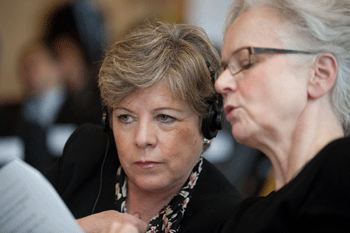German Government and ECLAC Reassert Strategic Partnership for Cooperation on Development Issues
The accomplishments of cooperation efforts between Germany and ECLAC in areas such as social equality, the role of the State, taxation, climate change, energy efficiency and sustainable development were reviewed.

(12 November 2010) The Executive Secretary of the Economic Commission for Latin America and the Caribbean (ECLAC), Alicia Bárcena, met this week with government officials of the Federal Republic of Germany, reasserting the importance of German technical cooperation in the region.
In the context of the "Latin America and the Caribbean-European Union Forum (LAC-EU): Fiscal Policy and an Environmentally Sustainable Economy in the Context of Climate Change", Bárcena held meetings with high-ranking government officials of the ministries of Cooperation, Foreign Affairs and Environment, as well as with members of Parliament of different political affiliation.
They ratified the strategic partnership between ECLAC and the Federal Ministry of Economic Cooperation and Development (BMZ), the German Technical Cooperation Agency (GZ) and International Training and Development (InWent).
This partnership has resulted in a cooperation programme that seeks to strengthen the capabilities of Latin American governments to formulate, implement and assess their public policies on sustainable development.
The programme covers areas such as planning, natural resource management and measures to address climate change, taxation, access to financing and social cohesion.
The programme is implemented through ECLAC projects supported by BMZ, GTZ and InWent.
During her trip to Germany, the Executive Secretary of ECLAC held a cordial meeting with the Federal Minister of Economic Cooperation and Development, Dirk Niebel, the Director General for Latin America and the Caribbean of the Federal Ministry of Foreign Affairs, Ambassador Bernhard Graf von Waldersee, and Harald Klein and Dorothee Fiedler, both high-ranking officials of BMZ in charge of Latin American cooperation.
In a meeting with the Vice Minister of BMZ, Gudrun Kopp, they discussed cooperation on climate change, in light of the Sixteenth Conference of the Parties to the United Nations Framework Convention on Climate Change (UNFCCC), to begin on 29 November in Cancun, Mexico, and the strategic nature and short and long-term importance of the partnership with ECLAC.
Bárcena outlined the progress made in ECLAC studies on the economics of climate change and the importance of taxation for strengthening the social pact. She also stated the Commission's intention to articulate cooperation efforts among countries of the region and Germany in the framework of its recent report "Time for Equality: Closing Gaps, Opening Trails".
Cooperation projects over the past few years have included a number of studies, documents, databases, manuals and seminars that have served to increase Latin American policymakers' knowledge and helped create a regional network of experts and a community of practitioners.
Kopp acknowledged ECLAC as an essential strategic partner and reflected on the importance of renewing ties between Latin America and Germany.
In a meeting with members of the German Parliament (Bundestag), Bárcena presented a complete overview of the current economic and social situation in the region and invited them to support cooperation projects between Europe and Latin America and the Caribbean. She encouraged them to continue deepening ties between Germany and the region, which are characterized by "shared values and a commitment to ensure global public goods".
Bárcena also stated that ECLAC is exploring new means of cooperation, especially with mid-income countries.
"Social equality and economic growth are not mutually exclusive. Growth requires equality and vice versa. Promoting equality by fomenting human capabilities and acting directly on inequality is possible," she said.
"In this, a stronger State with solid institutions can contribute effectively to greater democratic governance, in addition to its central role in equality, understood as the full entitlement of rights," she added.
For inquiries, please contact ECLAC's Public Information and Web Services Section.
Email: dpisantiago@cepal.org; telephone: (56-2) 210-2040.
Country(ies)
-
Germany
Related project(s)
Contact
Public Information Unit
- prensa@cepal.org
- (56 2) 2210 2040
